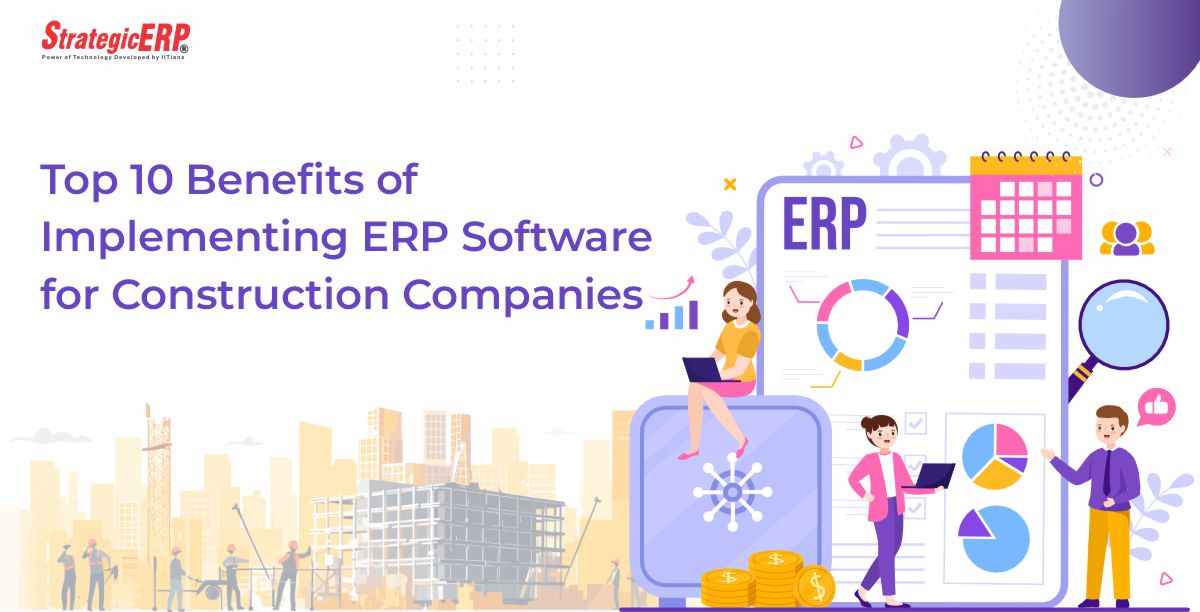Top 10 Benefits of Implementing ERP Software for Construction Companies
Category : Digital Transformation
Blog posted by : Admin / 27 Jun, 2024
The construction industry thrives on precision and efficiency. Meeting tight deadlines, managing budgets, and collaborating across various teams are crucial for success. Yet, 35% of construction professionals lose over 14 hours weekly on non-productive tasks like rework and resolving disputes. This inefficiency translates to lost time, money, and frustrated clients.
So, how can you ensure that your organisation doesn’t face the same problem? The answer is Construction Enterprise Resource Planning (ERP) systems.
These systems are designed specifically for the industry’s needs and integrate various functionalities into one central platform. By integrating all critical business processes – from project management and financial accounting to procurement and payroll – into a centralised database, construction ERP systems provide a unified platform for seamless operations and data-driven decision-making.
In this article, we discuss the various benefits of ERP software for construction companies. Read along!
Challenges Faced by Construction Companies Without ERP
Inaccurate project planning without ERP software can result in substantial losses, impacting labour costs, customer satisfaction, and overall brand perception. Also, untimely project completion due to coordination difficulties can lead to mistakes in scheduling, resource channelling, and adherence to design specifications.

A few more challenges that your construction company might face without an ERP solution are:
-
Managing Multiple Clients: Without ERP and CRM software, managing information transfer between various clients becomes cumbersome. Manual processes can cause delays and mistakes, while the absence of cloud ERP backup creates a risk of unauthorised access to sensitive information.
-
Inadequate Communication: Without an ERP system, there is a risk of fragmented communication between departments and teams. It can result in overlooked tasks, impacting project success.
-
Unrealistic Expectations and Estimations: Accurate bids and cost estimates are essential for project success in the construction sector. Without ERP systems, human errors and irrelevant data may cause issues with accuracy in estimations, resulting in underbidding or cost overruns.
-
Inefficient Decisions: Construction projects, especially complex ones, require swift and accurate decision-making. Lack of real-time data—because of no ERP solution—can lead to inefficient workflow, while manual decision-making is prone to errors.
10 Benefits of Implementing ERP Software
From managing materials and budgets to streamlining project timelines and communication, construction companies require robust tools to navigate the complexities of their operations. ERP software offers a comprehensive solution, integrating various aspects of a construction business into a single platform.

Some of these benefits of ERP in the construction industry include:
Enhanced Project Management
ERP software for construction equips you with robust tools to streamline planning, scheduling, and resource allocation processes. Centralising project data gives you a comprehensive overview, enabling informed decision-making and proactive risk mitigation. With features like Gantt charts, critical path analysis, and real-time tracking, you can optimise timelines, identify bottlenecks, and make data-driven adjustments on the fly.
For instance, StrategicERP—the best infrastructure ERP software—provides a panoramic view of your projects, allowing you to monitor progress, assign tasks, and allocate resources based on real-time data. Its advanced scheduling algorithms and what-if scenario analysis empower you to make strategic decisions, ensuring projects stay on track and within budget.
Streamlined Communication
ERP systems facilitate centralised information sharing, eliminating siloed data and ensuring team transparency. Automated notifications and alerts keep everyone informed about critical updates, deadlines, and potential risks, fostering a collaborative environment and minimising costly miscommunications.
Better Financial Management
Construction projects are inherently complex, with numerous financial considerations to account for. ERP software for construction integrates budgeting, forecasting, and accounting systems, providing you with a comprehensive financial overview. By consolidating data from various sources, you can accurately track costs, monitor budgets, and make informed decisions to optimise resource allocation and minimise overruns.
Efficient Document Management
ERP systems streamline document management by providing a centralised repository, ensuring easy access and retrieval. With advanced search capabilities and version control, you can quickly locate the necessary information, eliminating time-consuming manual searches and minimising errors.
StrategicERP offers a secure and organised platform for storing and managing legal documents, contracts, and compliance records, ensuring you remain compliant and protected throughout the project lifecycle.
Enhanced Data Analysis and Reporting
ERP systems offer robust data analysis and reporting capabilities, providing real-time insights into every aspect of your operations. From project performance metrics to financial forecasts, you can access customisable reports tailored to your needs, enabling informed decision-making and strategic planning.
For example, StrategicERP offers real-time visibility into project budgets, forecasts, and progress information. With its intuitive dashboards and customisable reporting tools, you can quickly identify trends, pinpoint bottlenecks, and make data-driven adjustments to ensure your projects stay on track and within budget.
Improved Compliance and Risk Management
ERP software for construction streamlines compliance tracking and provides risk assessment tools, helping you mitigate potential issues before they escalate. With automated alerts and real-time monitoring, you can stay ahead of regulatory changes, ensuring your projects adhere to industry standards and minimise the risk of costly penalties or delays.
StrategicERP’s Statutory Management module is designed to simplify compliance processes, generate tax-related reports, handle multiple budget codes, and ensure seamless integration with regulatory bodies. This proactive approach to compliance protects your business and enhances your credibility with clients and stakeholders.
Better Inventory and Equipment Management
Efficient inventory and equipment management is crucial for construction projects, where materials and assets are constantly in flux. ERP systems provide real-time inventory tracking, allowing you to monitor stock levels, optimise procurement processes, and minimise wastage. Additionally, equipment maintenance scheduling ensures your valuable assets are well-maintained, reducing downtime and extending their lifespan.
To help streamline this, StrategicERP offers segment-wise store creation, stock ledger management, and comprehensive reporting for stocks and pending requisitions. With its integrated Purchase Management module, you can streamline the requisition process, compare quotes, and create purchase orders, ensuring a seamless flow of materials to your construction sites.
Increased Productivity
ERP software allows you to maximise productivity by automating routine tasks and providing time management tools. From tracking employee time and attendance to scheduling tasks and monitoring progress, you can eliminate manual efforts, minimise errors, and ensure your teams operate at peak efficiency.
Client Management
Maintaining strong client relationships is paramount for construction companies, and ERP systems offer powerful tools to enhance client communication and collaboration. With centralised project data, you can provide clients with real-time updates on milestones, progress, and deliverables, fostering transparency and building trust. Additionally, integrated communication channels streamline interactions, ensuring prompt response times and seamless information sharing.
StrategicERP’s Client Management module excels in this area, enabling efficient management of client records, contracts, mobilisation costs, and RA bills. The ability to create comprehensive reports, such as proposed bar charts and receivables, allows you to keep clients informed and measure project performance effectively.
Scalability and Flexibility
As your construction business grows, your software solutions must grow with you. ERP systems offer scalable and flexible solutions, with customisable modules and the ability to integrate with other systems seamlessly.
This adaptability ensures your construction ERP software can evolve alongside your changing needs, providing a future-proof solution that supports your long-term growth strategies. Moreover, investing in StrategicERP allows you to tailor the software to your specific requirements and seamlessly integrate with third-party applications or legacy systems.
Conclusion
Implementing an ERP system is a must-have for construction companies seeking operational excellence. By integrating all critical business processes, automating workflows, and providing real-time visibility, ERP software allows you to optimise resource utilisation, enhance project management, and drive profitability.
Moreover, tools such as StrategicERP offer a comprehensive ERP solution tailor-made for the construction and infrastructure sector. With cutting-edge features like a voice command interface, AI-powered predictions, and seamless digital media integration, StrategicERP streamlines complex processes from project execution to resource planning.
Request a free Construction ERP software demo today and grow your construction business to a new level!
Frequently Asked Questions (FAQs)
How does ERP software enhance project management in construction?
ERP software enhances project management in construction by integrating various project management tools and functions into a single, cohesive system. This enables real-time tracking of project progress, resource allocation, and cost management, improving efficiency and reducing delays.
What are the key features of ERP software for construction companies?
Key features of ERP software for construction companies include project planning and scheduling, resource management, financial management, and procurement. Additionally, it offers modules for subcontractor management, compliance tracking, and on-site data collection, ensuring comprehensive oversight of all project aspects.
How does ERP software streamline communication in construction projects?
ERP software streamlines communication in construction projects by offering a centralised platform where all stakeholders can access and share information. This reduces the possibility of miscommunication and ensures everyone is on the same page, boosting collaboration and decision-making.
What are the benefits of data analysis and reporting in ERP software?
Data analysis and reporting in ERP software allow construction companies to gather insights into project performance, identify trends, and make data-driven decisions. This leads to better risk management, optimised resource use, and improved financial outcomes.
How does ERP software increase productivity in construction companies?
ERP software increases productivity in construction companies by automating routine tasks, lowering manual data entry, and improving workflow efficiency. This allows teams to prioritise high-value activities and ensures that projects are on time and within budget.








